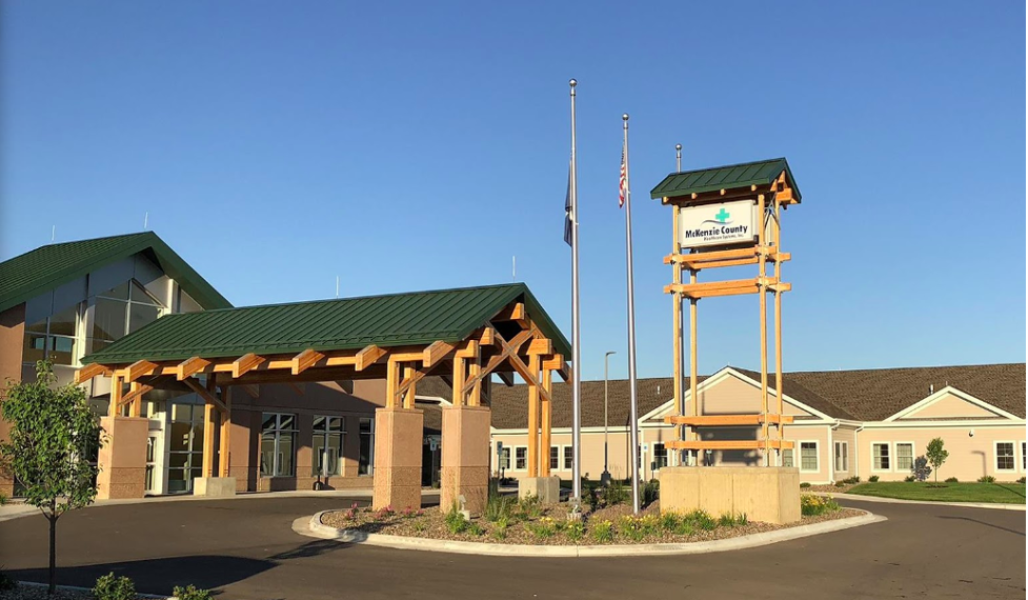
As COVID-19 Forces Big Players to Telehealth, Rural Healthcare Providers Benefit
When most people think of healthcare leadership, cutting-edge technologies, and medical developments, they probably think of the major hospitals and university-based healthcare systems. However, when it comes to telehealth technologies, many of the rural hospitals and healthcare facilities started before the big players.
Rural healthcare providers have struggled for years to provide better access to a wide variety of specialists as well as to doctors in short supply. This is a significant challenge for providers who are often serving a far-flung patient population. As a result, many rural healthcare systems started years ago, at least at some level, with telemedicine offerings. Technology allowed general practice doctors or emergency room staff to connect to specialists at larger hospitals hours away, providing higher quality, local-based services.

Photo description: McKenzie County Healthcare Systems
National Acceptance Helps Rural Provider Expand
McKenzie County Healthcare Systems, based in Watford City, North Dakota, was one such provider.
“We’ve actually been utilizing telehealth technology in a smaller capacity for five to seven years,” said Sam Perry, director of operations at McKenzie County Healthcare Systems. “It was really helpful to us when the rest of the country finally got on board during the COVID-19 pandemic. Insurance providers are reimbursing for more telehealth services as a result, which means that more specialists are willing to jump on the bandwagon. For us, that means we can access more specialist care for our patients. We already have the training, infrastructure, and staff to be able to grow with those needs now.”

Photo description: McKenzie County Healthcare Systems nurses
A Big, Positive Effect on Local Families
McKenzie County Healthcare Systems offers several services to children and families that use telehealth technology. “Our closest pediatric endocrinologist is six hours away,” Perry said. “In the winter, those roads can be dangerous or closed altogether. The fact that parents can connect to the doctor by phone is a huge win for local families. Our community is suffering from an economic downturn as the industry here is heavily oil and gas. Parents can’t afford to take time off of work, usually at least one or two days, to get that care for their children.
“As the larger healthcare system as a whole is more accepting of telehealth, there’s a trickle down effect,” Perry said. “Our patients can now get the treatment they need closer to home and to their family. They are much happier and recover faster.”
Perry recalls one pre-teenage patient who was suffering from some health issues that turned into an eating disorder. “The closest specialist was in Bismarck, which is three hours away,” Perry said. “By using telehealth, she was able to connect from here remotely three days per week. This individual has graduated from treatment and is now functioning well in the local school system.”

Photo description: Telehealth visit illustration
Telehealth Provides Immediate Triage in Emergency Situations
Another way that McKenzie County Healthcare Systems has benefited from telehealth technologies is in providing better emergency care.
“We’re a level five trauma center, and we usually have only one board-certified ER provider available at any given time,” Perry said. “Telehealth helps connect that ER doctor or ER nurse with a level one trauma center provider when needed. This has been especially helpful with stroke care, COVID care, and deep lacerations from vehicle accidents in particular.
“We chose not to accept acute COVID cases at our facility during the pandemic due to resource issues,” Perry continued. “However, if a COVID patient came in, we could immediately triage the individual, talk with a pulmonologist via telehealth, and determine medication, treatment, or care during transport. By the time triage was completed, life flight or transport was ready, and that patient was set up for a greater chance at a successful recovery.”
